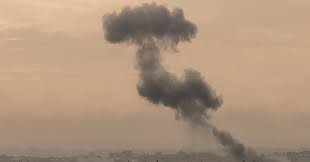Pakistan and the IMF are talking about a “standby arrangement” for USD 2.5 billion
Cash-strapped According to a Wednesday media report, Pakistan and the IMF are debating a new short-term standby agreement (SBA) worth around USD 2.5 billion to help the nation navigate through the political transition to the recently-elected administration in the second quarter of the current fiscal year.
With the program’s expiration on June 30, Pakistan’s ninth review by the International Monetary Fund (IMF) under the 2019 Extended Fund Facility (EFF) for the release of a USD 1.2 billion tranche is still waiting.
The remaining portion of the EEF ending June 30 has led Pakistan and the IMF to consider a new short-term (six to nine months) standby agreement (SBA) worth around USD 2.5 billion, according to the Dawn daily.
According to a statement from the PM Office, Pakistani Prime Minister Shehbaz Sharif spoke with IMF Managing Director Kristalina Georgieva on Tuesday about the IMF programme and expressed the expectation that collaboration on the rescue program’s key issues would result in a decision from the world leader in a day or two.
2019 saw the signing of a USD 6.5 billion deal between Pakistan and the IMF in Washington. Due to the donor’s desire that Pakistan finish all legalities, the plan was repeatedly delayed, and the final payment is still waiting.
The SBA is one of two options that the two parties are currently debating after the government fulfilled all of the requirements and prerequisites for the ninth review as well as those for the subsequent 10th and 11th tranches without disbursing the USD 2.5 billion funds that have been outstanding since October 2022, according to the report.
In recent back-to-back meetings between Prime Minister Sharif and Georgieva, including the one over the phone on Tuesday morning, the ideas have also been explored at the staff level.
The publication reported an official as stating, “In the strict sense, we have completed conditions of not only the 9th review, but with the revised budget, the terms of 10th and 11th reviews had also been met and (Pakistan) deserves disbursement of entire outstanding approved quota.”
The official noted that the two parties had recently exchanged a memorandum of economic and financial policies (MEFP) in order to complete the 9th review.
The Fund’s regulations, however, do not permit speedy evaluations, especially because the programme’s one-year extension ends on June 30. Georgieva revealed this to Sharif, the prime minister, in Paris.
The Pakistani government’s prompt completion of policy steps has been commended by the IMF. Although IMF personnel had previously voiced concerns about the first budget submitted on June 9, they have now certified that the updated budget, which included new levies, spending reductions, the termination of the amnesty programme for remittances, and other changes, had satisfied the program’s conditions.
The distribution of USD 1.1 billion under the 9th review is one of the two choices. However, if this were to be authorised by the IMF executive board, the programme would be terminated and there would be no chance for the release of the two more tranches of USD 1.4 billion.
The report further said that this is not the government’s favoured choice since Pakistan would forfeit quota worth USD 1.4 billion that was granted by the IMF executive board.
The other option being considered is to engage into a new short-term agreement with an upfront payment equal to the 9th review (USD 1.1 billion) within the next 15 days, followed by two to three more reviews for up to USD 500 million each.
In light of the fact that the present administration will conclude its term in less than two months and be replaced by a caretaker administration until fresh elections are held, this would convey a message of stability to the markets.
By June 30, the two parties must publicly declare a staff-level agreement on both choices in order to foster trust. The executive board’s endorsement may come within the next week or two.
The newspaper cited insiders as stating, “For us, the priority is to secure the entire amount of USD 2.5 billion,” adding that although the government had offered SBA a bigger sum, it may have been asking too much.
However, in order to do so, the government might need to raise the petroleum levy by up to Rs 5 per litre in the upcoming pricing review in order to guarantee at least an average of Rs 55 per litre for the entire year and to commit to the accelerated regulatory process for rebasing electricity tariffs by Rs 5-8 per unit with effect from July 1 even if its approval takes a few weeks.
Both EFF and SBA windows are of a similar type, with the exception that EFF addresses medium-term balance of payment difficulties over a longer period of time (three to four years), while SBA is often short-term (9 to 24 months) and has more flexible conditions.
Pakistan, however, anticipated inflows from friendly Arab nations over the coming days to complete the fiscal year with a stronger position in its foreign currency reserves. Pakistan urgently needs a loan from the IMF, which would open doors for more finance from other multilateral and bilateral donors to supplement its paltry foreign reserves, which now stand at around USD 4 billion.
Since many years ago, Pakistan’s economy has been in a fast slide, putting enormous pressure on the underprivileged masses via unbridled inflation and making it almost difficult for a large number of people to make ends meet.
Pakistan recently had a meeting of the electoral commission to begin general election preparations. On August 12, the current National Assembly’s five-year term will come to an end. According to Pakistan’s Constitution, a new general election must be held within 60 days.







